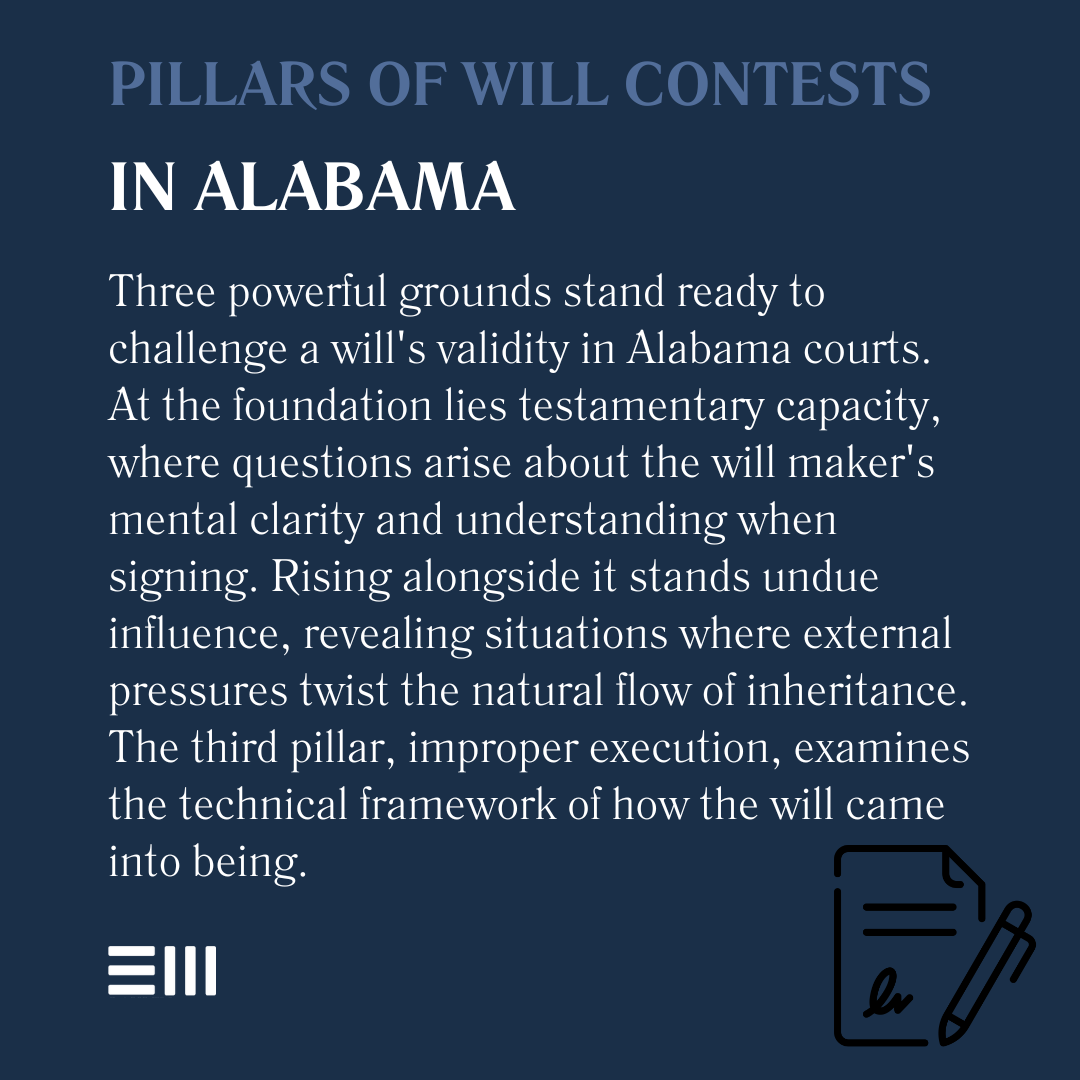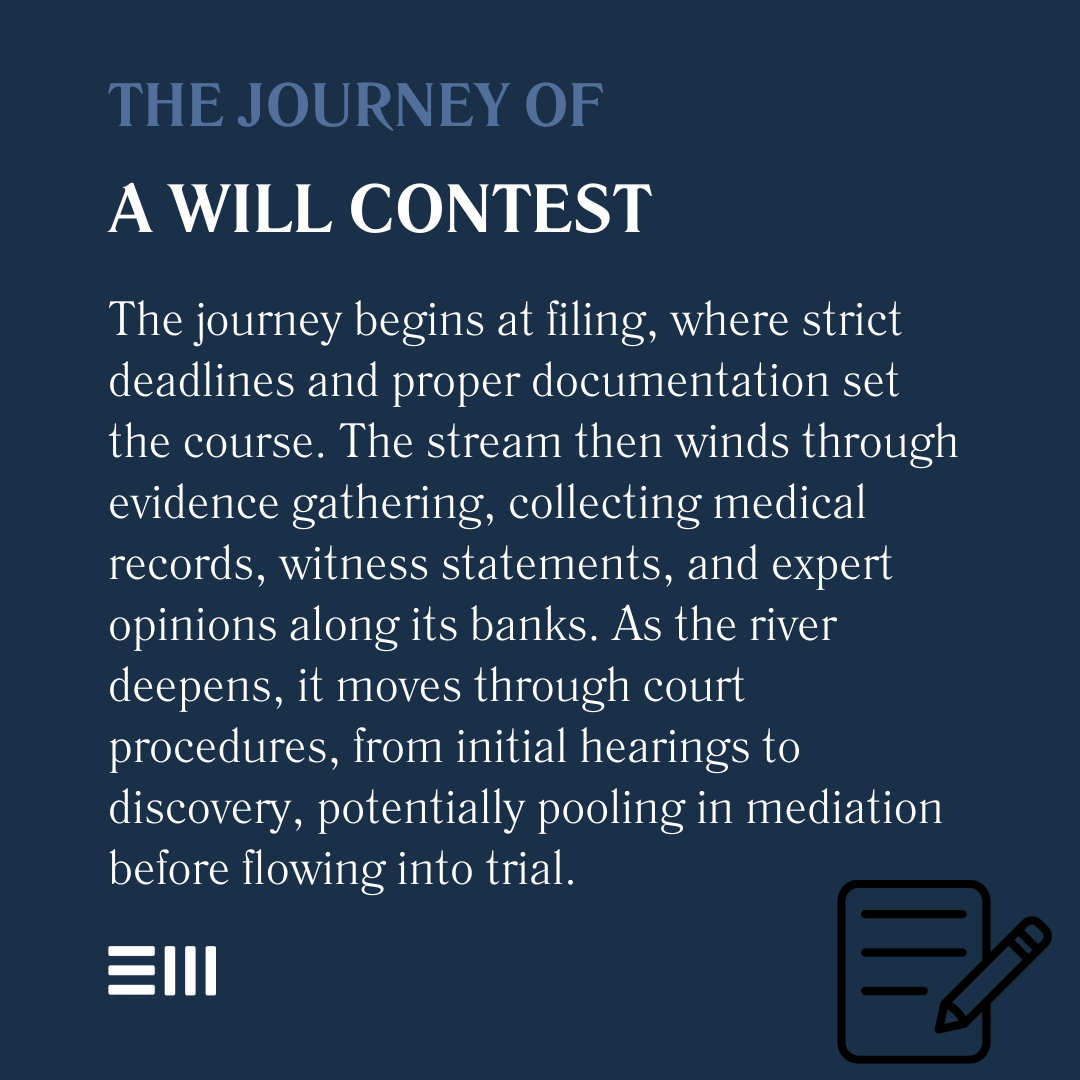Every disputed will tells a story of family dynamics, unexpected decisions, and questions left unanswered.
Behind closed doors in Alabama courtrooms, these stories unfold as children discover they've been disinherited, siblings receive drastically different shares, or caregivers suddenly appear as primary beneficiaries.
While challenging a will requires careful consideration, understanding your rights can mean the difference between accepting an unjust outcome and protecting your family's true legacy.
Legal Grounds for Contesting a Will
In Alabama, successful will contests must be built on solid legal foundations.
The courts take these challenges seriously, requiring clear evidence of specific legal grounds before proceeding with any contest.
Lack of Testamentary Capacity
The most common ground for will contests involves the testator's mental state when creating or modifying the will.
Understanding this complex issue helps determine if you have a valid case.
- Mental Clarity: Evidence of confusion or dementia;
- Understanding of Assets: Awareness of property and its value;
- Recognition of Relationships: Knowledge of family members and obligations;
- Comprehension: Understanding the effect of the will's provisions; and
- Medical Evidence: Professional evaluations of mental state.
These factors work together to establish or challenge testamentary capacity. Courts examine all available evidence to make their determination.
Undue Influence
Undue influence occurs when someone exerts excessive pressure on the testator. Recognizing the signs helps identify potential cases.
- Isolation: Limiting access to family and friends;
- Dependency: Creating reliance on the influencer;
- Changes: Sudden alterations to long-standing plans;
- Control: Dominance over daily activities and decisions; and
- Timing: Suspicious changes near end of life.
Courts carefully evaluate these elements when considering undue influence claims. Each factor contributes to the overall assessment.
Improper Execution
Will contests often succeed when proper execution procedures weren't followed. Alabama law requires specific steps for valid will creation.
- Signature Requirements: Proper signing by testator;
- Witness Standards: Two witnesses present;
- Notarization: Proper acknowledgment when required;
- Document Format: Meeting legal document standards; and
- Filing Procedures: Correct submission to probate court.
Proper execution ensures will validity. Any deviation may provide grounds for contest.
The Will Contest Process
Contesting a will involves specific legal procedures and timelines. Understanding this process helps ensure the proper presentation of your case.
Filing Requirements
Initial steps in contesting a will must follow strict guidelines.
Proper filing establishes your right to challenge.
- Time Limits: Meeting statutory deadlines;
- Standing: Proving right to contest;
- Documentation: Gathering supporting evidence;
- Venue: Filing in proper court; and
- Notice: Informing all interested parties.
Meeting these requirements preserves your right to proceed. Careful attention to detail matters.
Evidence Collection
Building a strong case requires thorough evidence gathering.
Different types of evidence support various contest grounds.
- Medical Records: Supporting capacity claims;
- Witness Statements: Documenting observations;
- Financial Records: Showing unusual transactions;
- Communication Records: Demonstrating relationships; and
- Expert Testimony: Professional opinions.
Strong evidence strengthens your position. Systematic collection improves case outcomes.
Legal Procedures
Will contests follow specific court procedures.
Understanding these steps helps prepare for the process.
- Initial Hearing: Presenting preliminary evidence;
- Discovery: Gathering additional information;
- Depositions: Recording sworn testimony;
- Mediation: Attempting settlement; and
- Trial: Presenting the case to court.
Each step requires careful preparation. Professional guidance ensures proper procedure.
Common Challenges in Will Contests
Will contests present unique challenges requiring careful navigation. Understanding these challenges helps prepare effective responses.
Family Dynamics
Family relationships often complicate will contests. Managing these dynamics requires sensitivity and strategy.
- Emotional Stress: Handling personal conflicts;
- Communication: Maintaining productive dialogue;
- Relationship Preservation: Protecting family bonds;
- Shared Interests: Finding common ground; and
- Future Planning: Considering long-term impact.
Careful handling of family matters improves outcomes. Professional mediation often helps.
Cost Considerations
Will contests involve various expenses. Understanding potential costs helps in planning your approach.
- Legal Fees: Attorney representation costs;
- Expert Witnesses: Professional testimony expenses;
- Court Costs: Filing and procedure fees;
- Investigation: Evidence gathering expenses; and
- Time Investment: Personal time commitment.
Careful cost-benefit analysis guides contest decisions. Professional guidance helps assess viability.
Settlement Options and Alternative Resolution
Will contests don't always require full court battles.
Understanding your options for resolution helps you choose the most appropriate path forward for your situation.
Mediation Benefits
Mediation offers a structured approach to resolving will contests outside of court. This process can provide advantages for all parties involved.
- Cost Savings: Reduced legal and court expenses;
- Time Efficiency: Faster resolution than litigation;
- Relationship Preservation: Less adversarial approach;
- Flexible Solutions: Creative settlement options; and
- Privacy Protection: Confidential proceedings.
These benefits make mediation an attractive option for many families. Professional mediators help facilitate productive discussions.
Structured Settlements
Structured settlements provide organized approaches to resolving will contests.
Understanding these options helps in negotiating favorable outcomes.
- Payment Plans: Spreading distributions over time;
- Asset Division: Alternative distribution methods;
- Trust Creation: New structures for asset management;
- Tax Consideration: Efficient settlement structures; and
- Future Planning: Long-term financial arrangements.
Careful settlement planning improves outcomes for all parties. Professional guidance helps optimize arrangements.
Documentation and Record Keeping
Proper documentation strengthens your will contest case. Maintaining organized records helps support your legal position.
Essential Documents
Successful will contests require comprehensive documentation. Understanding necessary records helps build a strong case.
- Previous Wills: Earlier versions showing changes;
- Medical Records: Health documentation;
- Financial Records: Transaction histories;
- Communication Records: Letters and emails; and
- Witness Statements: Written observations.
Thorough documentation supports legal arguments. Professional organization improves accessibility.
Documentation Timeline
Creating a chronological record helps establish patterns. Understanding the sequence of events strengthens your case.
- Historical Records: Past family arrangements;
- Recent Changes: Timeline of modifications;
- Medical History: Health-related events;
- Financial Activities: Transaction patterns; and
- Personal Interactions: Communication records.
Clear timelines support legal arguments. Professional review helps identify relevant patterns.
Frequently Asked Questions About Contesting a Will in Alabama
Navigating will contests in Alabama raises important questions.
These answers address common concerns about the process in Alabama.
How Long Do I Have to Contest a Will in Alabama?
You must file within six months of the will's admission to probate, with few exceptions for fraud or newly discovered evidence.
Who Can Contest a Will in Alabama?
Individuals who would inherit under intestacy laws or under a previous will have standing to contest.
What Happens if a Will Contest Succeeds?
The court may invalidate the entire will or specific provisions, potentially reverting to a previous will or intestacy laws.
Can I Contest a Will Without a Lawyer?
While possible, professional representation significantly improves your chances of success given the complex legal requirements.
How Long Does a Will Contest Take?
Contests typically take six months to two years, depending on complexity and court schedules.
What Evidence Do I Need to Contest a Will?
Required evidence depends on contest grounds but may include medical records, witness testimony, and documentation of unusual circumstances.
Transform Your Concerns Into Action
You've taken the first step in understanding your rights regarding will contests in Alabama. Our experienced team stands ready to evaluate your case and guide you through this challenging process.
Contact us today for a confidential consultation. We'll help assess your situation, explain your options, and develop a strategy to protect your interests.


